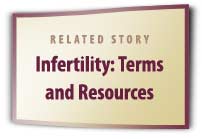
HROUGHOUT THE BIBLE STORIES of lineage carry on the tales of righteous heroes and fallen foes. The Good Book is a study in genealogy itself. However, along with the accounts of generations “begotten” from one to another are those of a contrasting fate. Stories of couples who were barren—as in dry like the desert—unable to ensure that their bloodlines would carry on, and thought to be cursed in their childlessness. We can think of examples such as Sarah, Hannah, Elizabeth, and many more whose struggles were not chronicled in the Bible.
Though today we don’t refer to people unable to have children of their own as barren (and thank goodness for that), in all forms infertility is a very real condition. It is real in every culture, religion, nation, tribe, and community throughout the world. And it is a reality for many Adventist couples today.
Chances are there are currently childless couples in your own congregation, struggling with infertility. Often they struggle in silence, bravely smiling in a church congregation filled with families. They smile at (or ignore) pitying glances cast their way, or endure cheap shots at their perceived childlessness, with ignorant comments from uninformed people. Still, they are brothers and sisters in Christ wrestling with God over something that seems so simple to so many others: having a child.
The following interview with John and Sarah* is a true account of their struggle with infertility. They are a professional couple, happily married for 10 years, committed to their local church, active in youth ministry, and for many years unable to conceive. John (a cancer survivor) and Sarah married, thinking that children were not a long way off in the future; and they looked forward to raising a family of their own with the same hopes and dreams as any newlywed couple. It is not their aim to convince readers of the merits of one option over another, but they wish to share their experience so that others struggling in the same situation might take comfort and find hope in God’s marvelous ability to make dreams come true.
 Wilona Karimabadi: Describe your feelings about having children from the moment you were married.
Wilona Karimabadi: Describe your feelings about having children from the moment you were married.Sarah: I always wanted children, but I knew deep down inside that I might have trouble. In fact, I told John that when we were dating.
John: I wanted to wait when we first got married. I knew I wanted children and that they were important to me, but I also felt I wasn’t ready. But after we’d talked during that first week after our wedding, we decided that we wouldn’t actively try not to have kids. I kind of figured it would be easy to have them—too easy—and that Sarah would end up pregnant soon after.
After not conceiving as quickly as you hoped, when did you come to the realization that something might be wrong?
Sarah: I knew that something was wrong after taking the first or second set of fertility pills. I knew that I was ovulating, but I still wasn’t getting pregnant. [This development occurred after four years of trying while still under the care of her gynecologist, but before they saw a fertility specialist.]
At that point, what did you think you should do about it?
Sarah: I kept thinking that if it was in God’s plan, He would cause me to get pregnant. I think deep down, I may not have been truly ready for kids with so much going on in our lives with church and other things.
John: I thought we should pray harder and increase the effort.
You belonged to a church (at the time) where there were pregnant women left and right, with new families being formed constantly. How did that make you feel? Were you ever inwardly or outwardly angry or resentful of others who were having children with seeming ease?
John: It was really hard at times. There were times when we would come home and Sarah would just cry. But yet I was never angry or resentful of anyone who had kids. It’s hard to explain, but for each couple I found out was pregnant, I was not just happy for them but thrilled. And when someone would let me hold an infant, I can’t explain how thrilled and grateful I was just to have that opportunity. When our family or friends let us hold their infants, it was hard to give them back, even if they were wailing. I was just happy to be holding a baby.
Sarah: It was hardest for me when our close friends had their first baby. I was so excited for them, but when we got to the hospital to see them, I couldn’t bring myself to look at the new baby or even touch her for a little while. Then I came to the realization that this little child had nothing to do with the fact that I couldn’t have a child. It was also hard for me to see how some of our friends complained about their kids. It seemed to me that they took them for granted. I remember thinking that I wouldn’t take my kids for granted.
To know you two is to know that God factors into every facet of your life. Where were you in your faith walk while coming to grips with your infertility? What questions do you remember putting to God about the situation?
Sarah: I remember praying to God and saying: “Lord, if You want to, You can make me get pregnant. You just have to think of me and it would happen.” But it didn’t happen. I also remember asking: “Why me? Am I being punished for something I did in my past?”
John: I knew God was in control, but I did regularly wonder if a lack of faith on my part was the reason that we were not having children. Some of the questions I did ask God were
“Why haven’t You given us children yet?”
“Will You ever give us children?”
“What is Your plan for us if we don’t have children?”
“Do You want us to be involved with youth [at church] and not have any of our own? And if You didn’t want us to have kids, why did You have us get involved with youth in the first place, because it strengthened our desire to have children?”
How did your personal faith help you accept your infertility?
John: I think that if God had not been part of my life, our infertility would have been unbearable. For me, knowing that God was in control and that He had a plan gave me peace. As difficult as the thought was that there was the chance that God did not want us to ever have children, it strengthened me to know He has plans.
Describe what attitudes you may have felt from your church family regarding being childless.
John: Like most other couples in our church without kids, we experienced a range of attitudes:
“We are praying for you” (from genuine prayer warriors). Sometimes someone would come up and quietly tell us this. This helped. Sometimes someone would make a public statement that we needed to be kept in prayer about having kids. Usually this was embarrassing and didn’t help.
“Why is it taking so long?” Even though the comment was usually made as a joke without the person knowing what we were going through, as you can imagine, it was not helpful.
“Are you two OK?” Sometimes this was meant as “Is your marriage OK?” and others as “Are you infertile?” When spoken in true concern and not as a glib comment, I would sometimes tell them [how we were doing].
“God has cursed you because of your sinfulness. Repent and you will have children.” Since I knew the bad things I had done in my past and these people didn’t, I always wondered if that were true. Definitely not helpful.
I know many people prayed for us to have a child. Many more than ever told us. I even heard of prayer groups praying for us. I was grateful for these.
Once John and Sarah had met with more specialists and gotten a better idea of the concrete medical reasons behind their inability to have children, they explored their options. One of those options was in vitro fertilization (IVF) (see sidebar). After much prayer and consideration, this was the option they believed God wanted them to try. It was the option that eventually resulted in the birth of two healthy, beautiful children.
 How did you decide that IVF was the way to go to have children?
How did you decide that IVF was the way to go to have children?Sarah: We first wanted to see if it was possible to have our own children before we pursued adoption. We were not sure whether after John’s chemo (from his earlier bout with cancer) and the problems I was having it would be possible. After our consultation with doctors, things seemed optimistic.
John: After trying “natural” methods for a while, we were told we needed to see a specialist. Each decision to go to a more “unnatural” method was difficult because I would question my level of faith each time. When I finally arrived at the point where I thought we should try IVF, it was because I believed that we must use the tools God puts in our reach. At that point I was mentally ready to try IVF and I strongly believed (and still do) that if God didn’t want us to have children and we trusted Him, we would still not have any.
Did you ever consider adoption?
John: Yes, but we figured we would try IVF first and if not successful, would consider adoption. We may still do it in a couple of years when our youngest child is older.
During the IVF process, were you fearful? Peaceful?
Sarah: I was not fearful but nervous and peaceful. I knew at that point that I was doing everything I could possibly do from my end, and it was up to God to take care of the rest.
John: I was nervous and fearful that the answer from IVF would be that God did not want us to have children of our own, but I was excited that we had an opportunity to try. I was at overall peace knowing that God was in control.
When IVF worked the first time around, describe your feelings.
Sarah: When we found out I was pregnant, we wanted to tell everyone but didn’t, mainly because of the fact that I was high risk already. We wanted to wait several months before telling anyone.
Sarah, while carrying your first baby, who was truly such a miracle, did you feel like Hannah in the Bible?
Sarah: Yes, I felt very much like Hannah. My faith in God was greater. I felt that it happened at the right time for us. God’s timing is always perfect and it was another confirmation of that.
When you saw your first baby for the first time, what were your immediate feelings?
John: We saw the embryo on day 3, which was neat because I can truly say I saw my child soon after conception. We also had many more ultrasounds than normal. My feelings each time were a combination of God is amazing and I’m not worthy of any of His blessings, let alone this. When I saw our baby for the first time, my head was spinning that we actually had a baby. My immediate thoughts toward God were: Thanks for this experience. Thanks for the gift of a child. Thanks for blessing me even though I’m not worthy. And I need Your help because I don’t know what I’m doing!
Sarah and John went on to conceive another child through IVF a few years later and went through a similar process, of putting it all out there for God to direct them and bless them. And He did.
Do you think the Adventist Church as a whole is open and supportive to couples who are infertile?
John: Because not many people discuss it openly (we didn’t), it’s hard to tell. I think that the church is probably supportive of infertile couples, but when someone starts discussing IVF or adoption, I think it is a very different story. I have experienced that many people in our church are opposed to anything other than prayer and natural conception. I have sat in many discussions where people who didn’t know we went through IVF condemned either or both methods [including adoption] of having children. These have also been the same people who say how wonderful our two children are. Boy, if they only knew!
Sarah: I don’t think our denomination is that supportive to couples who are infertile. I think that most people will say they will pray for you, but I wonder what they would say if they knew what [avenues] you were pursuing.
 If you could send a message to members around the world regarding your experiences, what would it be?
If you could send a message to members around the world regarding your experiences, what would it be?John: Watch what you say. You never know what a person is going through. Find a way to be accepting of others and make sure your first reaction is not condemnation. The loving spirit can be felt and is a major source of encouragement to those struggling.
Sarah: God’s timing is so perfect. He is so in control, and I love that. To me it was a great comfort [to know] that He will take whatever we do and if we trust Him, He will turn it out for the best.
What would you say to other Adventist couples facing infertility?
Sarah: Do whatever you can that is within your reach and God will take care of the rest.
John: You are not alone. You are not strange because you are having difficulties conceiving. You are not cursed by God because you are not having children. God has special plans for you and your spouse.
__________
*Names were changed to protect their privacy.
____________________
Wilona Karimabadi is marketing and editorial director for KidsView, Adventist Review’s magazine for children.

 How did you decide that IVF was the way to go to have children?
How did you decide that IVF was the way to go to have children? If you could send a message to members around the world regarding your experiences, what would it be?
If you could send a message to members around the world regarding your experiences, what would it be?